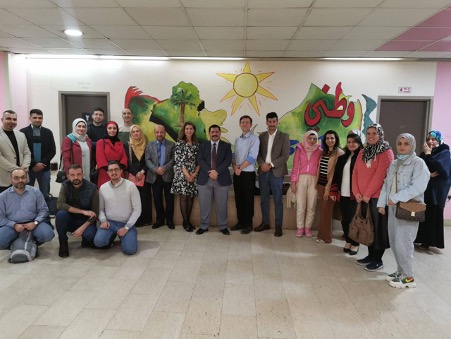ECG: Destination Baghdad
By: Dr Dina Mahmood, Sydney Children’s Hospital Network, Sydney, Australia
It was not long after IACAPAP Dubai congress that a few members of the Early Career Group (ECG) were set about a new adventure for an exciting educational collaboration in Baghdad. A workshop titled ‘Formulation in Child and Adolescent Psychiatry’ was coordinated and conducted before the end of 2022, chaired by Child and Adolescent Psychiatrists from Iraq, Australia and the United Kingdom. The collaboration demonstrated a powerful peer support exercise for our group as there were IACAPAP early career members in both presenter and audience sides.
Child and adolescent psychiatry as a formal subspecialty qualification is reasonably new in Iraq. Therefore, any opportunity to obtain fine skills in the art of caring for children’s mental health was strongly desired and invited. Since 2019, three locally accredited child and adolescent psychiatrists emerged and another three joined the fellowship training program. Such a humble number to join a thin workforce of psychiatrists servicing an area torn by years of armed conflict and political unrest, where the estimated target population likely to exceed 18 million children.
The local fellowship program received support in supervision and implementation from a group of Child and Adolescent Psychiatrists with interest in global mental health and mental health workforce development. The group relied on online platforms and accessible resources such as the IACAPAP textbook and other open access publications. The launching of the IACAPAP Early Career Group program was a great opportunity for those freshly certified child and adolescent psychiatrists, fellowship trainees, and even for some of the supervisors to become part of a group with shared interests where they can exchange Child and Adolescent Mental Health (CAMH) resources and continue to develop.

Participant group photo, Child's Welfare Teaching Hospital-Baghdad Iraq
IACAPAP Early Career Group Program caters to professionals with dedicated careers in Child and Adolescent Mental Health (CAMH) during their study time and within the first seven years of obtaining their qualification. It opens an array of possibilities for collaboration between professionals from well-resourced services and those coming from developing and poorly resourced ones to discuss service pathways, practice guidelines and research. It also allows knowledge exchange between peers within the group based on shared interests and expertise. Those concepts formed the basis of the joint effort to plan for the workshop.
It took few months of consideration between ECG members: Dr Andrew Belford- Australian trained Child and adolescent psychiatrist practicing in UK, Dr Zainab Alwardi- Child and Adolescent Psychiatrist from Iraq, Dr Mohamad Ali Saeed- CAMH trainee, and ECG coordinator Dr Dina Mahmood in liaison with IACAPAP individual member Dr Ali Alhussaini and other colleagues from Iraq until the moment of action, when Andrew and Dina managed to pack their light suitcases heading to Iraq, one week before Christmas. The visit was endorsed and supported by the president of the Iraqi Board of Psychiatry Dr Nesif Alhemiary with logistics around organisation, safety and transport. Eventually, a full-day workshop on formulation in Child and Adolescent Psychiatry was set up at the Child’s Welfare Teaching Hospital, the tertiary hub for children’s healthcare in Baghdad. IACAPAP ECG members between facilitators and attendees were joined by other junior and senior colleagues.
Workshops are great in the sense that they are based on audience engagement rather than being a didactic educational experience. They can often take a slower pace as the sharing of perspectives and knowledge is core. What was expected as outcome from discussing formulation with the audience in Iraq was an underestimate to the actual points raised at conclusion. The richness in the two local cases selected for our discussion was enough to spend the day unpacking. But additionally, we were taken through other challenges in the environmental and cultural contexts that made formulation an even more important task to find strengths and empathy, not only for the children and their families, but also for the stretched systems responding to their safety and wellbeing needs as they worked in silos. We have learnt more than we anticipated from such collaboration.

